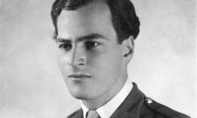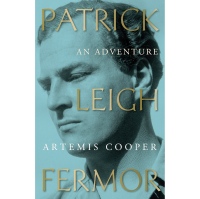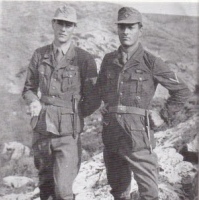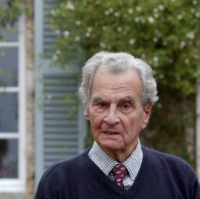- About Us
- Columns
- Letters
- Cartoons
- The Udder Limits
- Archives
- Ezy Reading Archive
- 2024 Cud Archives
- 2023 Cud Archives
- 2022 Cud Archives
- 2021 Cud Archives
- 2020 Cud Archives
- 2015-2019
- 2010-2014
- 2004-2009
 |
(January 2013) Writer, Fighter, Player |
The peak experience of my recent weeks has been reading the life story of Sir Patrick Michael Leigh Fermor, DSO, OBE, who left us in June at the age of 96 and whose biography by Artemis Cooper, was on the shelves in Britain by November.
Every now and again we learn of a figure who --depending on our mood or confidence --will either intimidate or inspire by his or her actions in a particular field. Rarely do we meet someone who can do it in so many.
If you think yourself a writer, a traveller, a fighter, a player, a boozer, a smoker, a carouser, a linguist or just a collector of friends; the chances are that Fermor, known to all and indeed by his biographer as Paddy, could almost certainly put you in the shade in any of these pursuits.
Before I read Ms Cooper’s excellent work my knowledge of Fermor was roughly as follows: that he had left school in England in 1933 without obvious prospects, lacked the inclination or ability to follow his friends to Oxford, Cambridge or Sandhurst and so (apparently unlike the tens of thousands of his cohort similarly limited) decided to walk to Istanbul. I knew that this walk had yielded two travel books which I will call legendary because overuse of this word should not scare us from using it properly, that these books, A Time of Gifts and Between the Woods and the Water covered the sections of his travels before and after the Danube, and that further, that Fermor had been a war hero on Crete, using three of his languages, his mother tongue, German and Greek, to operate behind enemy lines and capture the ranking German general on the island.
I had read A Time of Gifts and Between the Woods and the Water in the last year or so and had imagined that I was on top of all the content therein, but I was pleased with Ms Cooper for illuminating, elaborating, extrapolating and qualifying so much of Fermor’s own work. She fills gaps where they can be filled, decodes the odd pseudonym of people neither guilty nor innocent but simply old enough to not care anymore, explains the tortured process by which these books were delivered (appearing 44 and 53 years after the events within them!) and does a lot to account for the decision to make this walk in the first place, even it cannot be properly explained to the rest of us whose lives are less like the subtitle of this book, an Adventure.
Cooper sets things up by explaining how Fermor’s parents came together, their background in terms of location, career and of class—entirely appropriate in a book about England a century ago and probably now as well. She is perhaps unable to explain any better than the rest of us how Fermor had little interest in education but a passion for learning and for language in particular, with his knowledge of Latin verse proving to be helpful common ground when trying to manage the mood of the classically educated General Kriepe who was curled up at knifepoint in the footwells of his own staff limousine while two Brits whisked him through twenty-two of his own checkpoints.
She goes on to catalogue all of his travels and his writings and the challenge he proved to be to his own family, his publisher and it seems his bank managers. He was never really on top of his own finances and allowed others to make the running here.
Paddy handled about half a dozen languages well and many dialects capably also. He knew drama, song and verse in all of them: so he made a fist of any tavern, tabac or taverna, places he much preferred to any office. One sometimes meets a person who is the first to arrive at a party and the last to leave. Cooper conveys that Fermor was the party and comings and goings from this party were the business of other people.
She tells us how much he smoked: a lot. How much he drank: a lot. How many women came under his spell for long or short periods of time: a lot. It is hardly surprising: his surface level charisma was underscored by real heroism, the death defying sort, and the worldly sophistication of a man who was truly cross cultural.
One of his admirers, reports Cooper, said she had never met anyone so English, so much “ rather” and “ splendid” and “ beastly” and “ jolly good show” but Paddy put a premium on his Irish heritage even if the author says it is not easily authenticated and his first attempt to enlist at the start of WW2 was with the Irish Guards. Even while Britain was facing an existential threat the recruitment of officers was still subject to knowing the right chap, choosing the right regiment and saying the right things with the right accent. Paddy’s background was not quite to the mark in this respect. This to some extent explains his progression to SOE-Special Operations Executive and the dangerous specialised work of this branch of the armed forces.
After the war his orientation was largely Hellenic and he lived in Greece for most of his post-war years. The locals knew his story and idolised him. They saw him as a new Byron and he and his long suffering wife, Joan, hosted a list of visitors that a career name-dropper would have killed for. 
Cooper relates well his transition from war hero to writer, and those of us like Clancy who are unsuited the office will be amused by her describing Paddy’s only desk job, in which he arrived to the Athens office late, made a few desultory phone calls and then turned his attention to a café, a lunch or a long liquid meeting.
Artemis Cooper (actually she is The Hon. Alice Clare Antonia Opportune Beevor) is the wife of celebrated WW2 historian Antony Beevor with whom she has collaborated on previous works. She is also the granddaughter of Alfred Duff Cooper and Lady Diana Cooper who appear in the book as Fermor’s contemporaries and friends and the footnotes to the book indicate that much of Paddy’s story was given to the author in conversation with the man himself. This does not stop her from recognizing that he was not everyone’s cup of tea and she reports the believable accusation (or perhaps recognition) that he was “a middle class gigolo for upper class women”. Nice work if you can get it.
Byron was of course famously ‘mad, bad and dangerous to know’. Patrick Leigh Fermor was high spirited, not without flaws, but, it seems, a pleasure to know. The author thinks so and the book is full people who thought similarly. It is a book worth reading though perhaps the two travel books are sensible pre-reading.
It has inspired me to seek out more of his writing and this is high enough praise for the biographer let alone the subject.
